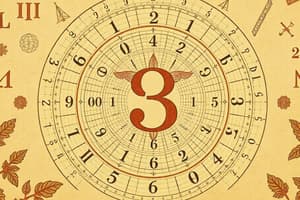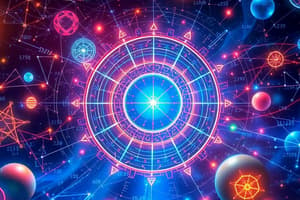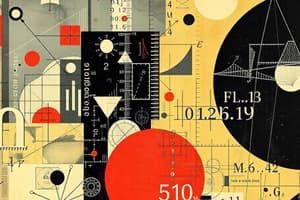Podcast
Questions and Answers
What concept in differential calculus is primarily concerned with the behavior of a curve at a specific point?
What concept in differential calculus is primarily concerned with the behavior of a curve at a specific point?
- Derivative (correct)
- Slope
- Accumulation
- Integral
Which statistical measure represents the middle value in a data set when organized in ascending order?
Which statistical measure represents the middle value in a data set when organized in ascending order?
- Mode
- Standard Deviation
- Mean
- Median (correct)
What is the primary goal of statistical inference?
What is the primary goal of statistical inference?
- To find the average value
- To summarize data
- To visualize data
- To make predictions about a population (correct)
Which of the following concepts is fundamental to both differential and integral calculus?
Which of the following concepts is fundamental to both differential and integral calculus?
In statistics, which of the following describes the measure of the dispersion of data points around the mean?
In statistics, which of the following describes the measure of the dispersion of data points around the mean?
Which of the following branches of mathematics focuses on the properties of shapes and their dimensions?
Which of the following branches of mathematics focuses on the properties of shapes and their dimensions?
What is a key aspect of algebra that distinguishes it from arithmetic?
What is a key aspect of algebra that distinguishes it from arithmetic?
Which property is NOT fundamental in arithmetic?
Which property is NOT fundamental in arithmetic?
In calculus, what does differential calculus primarily deal with?
In calculus, what does differential calculus primarily deal with?
What mathematical concept helps to demonstrate the validity of theorems?
What mathematical concept helps to demonstrate the validity of theorems?
Which of the following is an application of mathematics in everyday life?
Which of the following is an application of mathematics in everyday life?
What is an essential property for effectively performing calculations in arithmetic?
What is an essential property for effectively performing calculations in arithmetic?
Which branch of mathematics focuses on modeling and solving a wide range of problems, including scientific scenarios?
Which branch of mathematics focuses on modeling and solving a wide range of problems, including scientific scenarios?
Flashcards
Mathematics
Mathematics
The study of quantity, structure, space, and change using logical reasoning and abstract thought.
Differential Calculus
Differential Calculus
Branch of calculus dealing with rates of change, slopes, and tangents of functions.
Arithmetic
Arithmetic
Basic math operations (addition, subtraction, multiplication, division) with numbers like whole numbers, fractions, and decimals.
Integral Calculus
Integral Calculus
Signup and view all the flashcards
Algebra
Algebra
Signup and view all the flashcards
Statistical Inference
Statistical Inference
Signup and view all the flashcards
Geometry
Geometry
Signup and view all the flashcards
Statistics
Statistics
Signup and view all the flashcards
Statistical Measures
Statistical Measures
Signup and view all the flashcards
Calculus
Calculus
Signup and view all the flashcards
Branches of Math
Branches of Math
Signup and view all the flashcards
Mathematical Proofs
Mathematical Proofs
Signup and view all the flashcards
Mathematical Symbols
Mathematical Symbols
Signup and view all the flashcards
Study Notes
Fundamental Concepts
- Mathematics is the study of quantity, structure, space, and change.
- It involves logical reasoning and abstract thought.
- Different branches of mathematics exist, including arithmetic, algebra, geometry, calculus, and statistics.
- Mathematics employs symbols and notations to represent concepts precisely and concisely.
- Mathematical concepts are interconnected and build upon each other.
- Mathematical proofs demonstrate the validity of theorems and formulas.
- Mathematics has practical applications in various fields like science, engineering, and computer science.
Arithmetic
- Arithmetic deals with the basic operations: addition, subtraction, multiplication, and division.
- It involves working with whole numbers, fractions, decimals, and integers.
- Fundamental properties like the commutative, associative, and distributive properties are essential to perform calculations efficiently.
- Basic concepts like place value are crucial for understanding numbers.
- Arithmetic is used for everyday computations, such as calculating costs, measuring quantities, and solving everyday problems.
Algebra
- Algebra involves the study of symbols and the rules for manipulating them.
- It extends beyond arithmetic, employing variables to represent unknown quantities.
- Expressions and equations are key elements, allowing relationships between variables to be expressed.
- Solving equations and manipulating formulas are crucial aspects of algebra.
- Algebraic operations (e.g., factoring, expanding) and techniques (e.g., substitution) are used to simplify and solve problems.
- Algebra is used to model and solve a wide range of problems that arise from everyday life situations to more involved scientific scenarios.
Geometry
- Geometry is the study of shapes, sizes, and positions of figures and their properties.
- It encompasses points, lines, angles, surfaces, solid figures, and the space in which they exist.
- Various geometric shapes like triangles, circles, quadrilaterals, and polygons have specific characteristics.
- Geometric theorems provide understanding of relationships between shapes.
- Formulae describe dimensions and relationships involved in figures like areas, perimeters, volumes, etc.
- Applications extend from architecture to engineering and computer graphics.
Calculus
- Calculus deals with change and motion.
- It is divided into differential calculus (rates of change) and integral calculus (accumulation of quantities).
- Differential calculus involves concepts like derivatives, tangents, and slopes of curves.
- Integral calculus involves concepts like areas under curves, volumes of solids, and accumulation processes.
- Applications encompass finding rates of growth, optimizing functions, and calculating areas and volumes of complex shapes.
- Advanced mathematical tools, like limits and infinite series, are fundamental to understanding calculus.
Statistics
- Statistics is the science of collecting, organizing, analyzing, interpreting, and presenting data.
- It uses mathematical methods to summarize, visualize, and draw conclusions from data.
- Data can be represented in various formats like tables, charts, and graphs.
- Common statistical measures include mean, median, mode, variance, and standard deviation.
- Statistical inference involves making predictions and generalizations about a population based on a sample.
- It has applications in various fields like data analysis, research, and decision making.
Studying That Suits You
Use AI to generate personalized quizzes and flashcards to suit your learning preferences.




